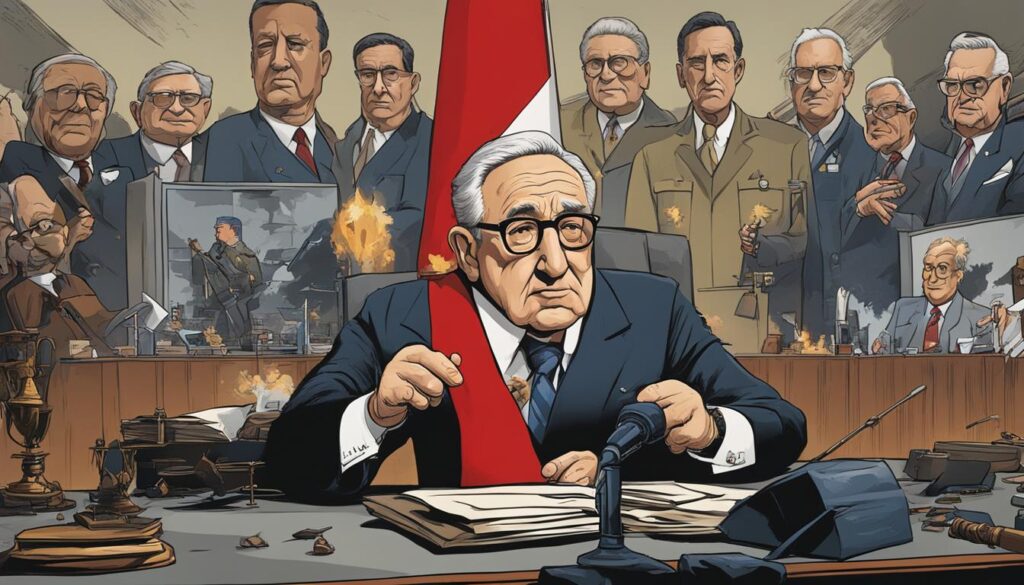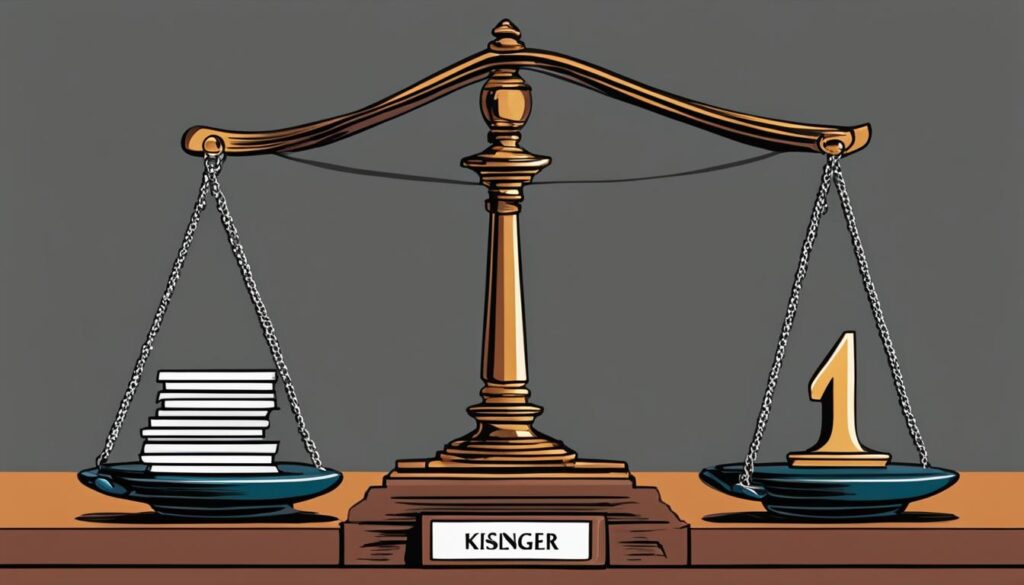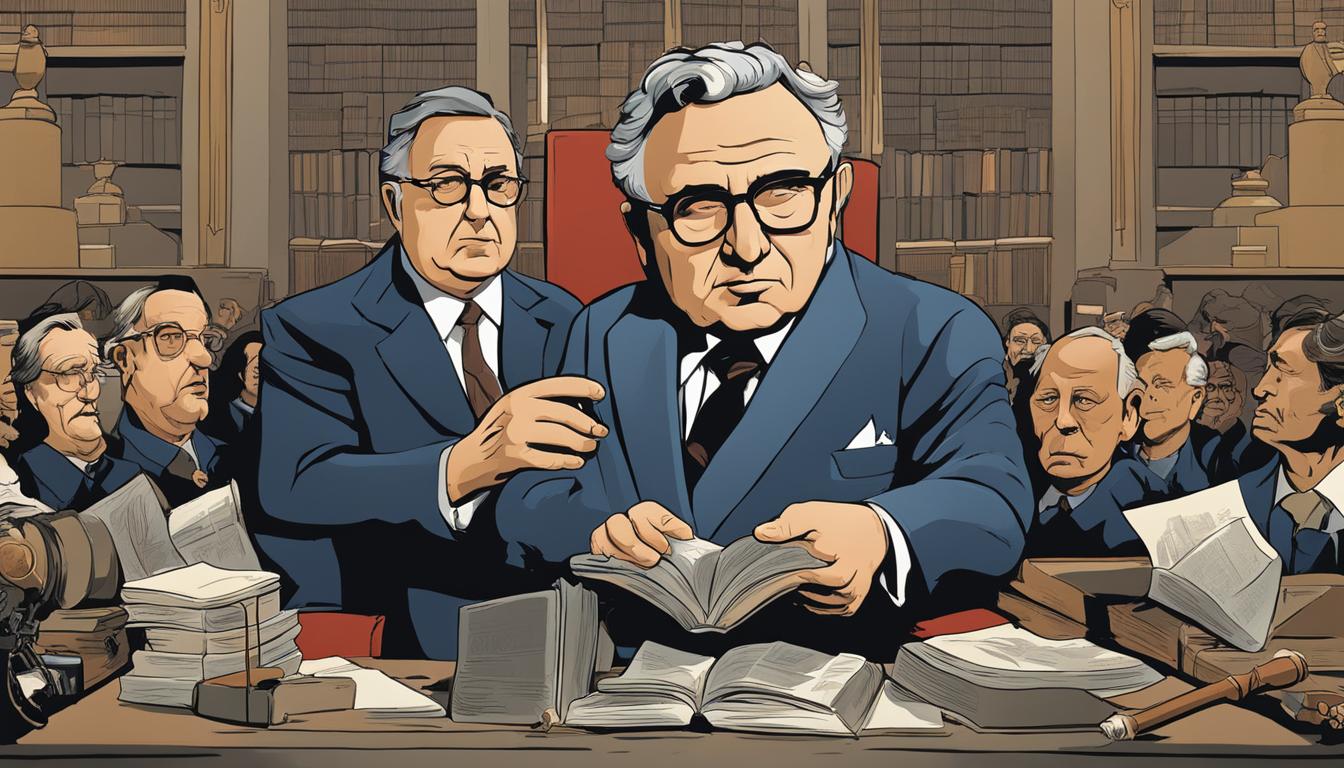In “The Trial of Henry Kissinger,” Christopher Hitchens presents a compelling case against the former National Security Advisor and Secretary of State, focusing on the historical controversies that have surrounded his political decisions. The book provides a thorough examination of the allegations against Kissinger, exploring the legal, ethical, and moral implications of his actions.
Hitchens’ investigative approach offers a unique perspective on the events and individuals involved, shedding new light on a chapter of American history that continues to spark debate and controversy. Through meticulous research and analysis, he presents a compelling argument for holding Kissinger accountable for alleged war crimes committed during his time in office.
Key Takeaways:
- The Trial of Henry Kissinger examines the controversial legacy of the former National Security Advisor and Secretary of State.
- The book presents specific arguments and critique of Kissinger’s actions by Christopher Hitchens, offering a unique perspective on the events and individuals involved.
- The prosecution presented a case against Kissinger, with specific allegations and legal arguments regarding his alleged war crimes.
- Key witnesses and testimonies played a crucial role in the trial, shaping the arguments put forth by both the prosecution and defense.
- The public’s response to the trial and its aftermath had a significant impact on Kissinger’s reputation and the ongoing debates surrounding his legacy.
Introduction to Henry Kissinger
Henry Kissinger, born in Germany in 1923, was a prominent American diplomat and political figure. He served as the National Security Advisor and Secretary of State under Presidents Nixon and Ford. Kissinger played a significant role in shaping American foreign policy during the Cold War era, particularly in relation to the Soviet Union and China.
Before his political career, Kissinger was a professor of government and international relations, teaching at Harvard University. He also wrote several influential books on foreign policy and international relations, including Diplomacy and The White House Years.
Kissinger’s background as an academic and scholar contributed to his unique perspective on diplomacy and international relations. However, his actions as a political figure were often controversial, sparking debate and criticism.
Throughout his career, Kissinger was known for his pragmatic approach to foreign policy and belief in realpolitik, which emphasized practical considerations above ideological or moral concerns. Critics, however, have argued that his policies and actions contributed to human rights violations and war crimes.
The Controversial Legacy of Henry Kissinger
Henry Kissinger’s legacy is riddled with controversies, stemming mainly from his time as National Security Advisor and Secretary of State. Critics have accused him of disregarding human rights and international law, with some even labeling him a war criminal.
One of the most significant controversies surrounding Kissinger is his role in the secret bombing campaign in Cambodia during the Vietnam War, which resulted in civilian casualties and destabilized the country. Additionally, his support of authoritarian regimes and involvement in covert operations in several countries, including Chile, Iran, and Guatemala, has drawn intense criticism.
Despite his firm belief in realpolitik, Kissinger’s actions have been the subject of extensive debates and public outcry, with many questioning his ethics and morality. The debate surrounding his legacy continues even today, with some defending his contributions to diplomacy and foreign policy.

Hitchens’ Case Against Kissinger
Christopher Hitchens’ investigative approach to “The Trial of Henry Kissinger” provides a compelling case against the former diplomat’s actions. Hitchens’ extensive research and analysis highlight several controversial actions by Kissinger.
One example is the secret bombing campaign in Cambodia, which resulted in the deaths of thousands of innocent civilians. Hitchens argues that Kissinger’s disregard for human life was evident in his decisions and accuses him of being complicit in war crimes.
Furthermore, Hitchens criticizes Kissinger’s involvement in the overthrow of democratically elected governments in Chile and Argentina. He argues that Kissinger’s political interests took precedence over human rights and democracy and that these actions were inexcusable.
Hitchens’ case highlights several instances where Kissinger’s actions were unethical, immoral, and even criminal. His investigative approach provides a detailed insight into the former diplomat’s actions, providing a strong basis for the prosecution’s case against Kissinger.
The Case Against Kissinger: Summary of Key Points
| Actions | Criticisms |
|---|---|
| Secret bombing campaign in Cambodia | Disregard for human life, accusations of war crimes |
| Involvement in the overthrow of democratically elected governments | Complicity in human rights violations, prioritization of political interests over democracy and human rights |
| Covert support of authoritarian and oppressive regimes | Support of human rights violations and oppression, disregard for democratic values |
The table summarizes the key criticisms of Kissinger presented by Hitchens and the prosecution. It underscores the severity of the allegations and the significant impact of Kissinger’s decisions on human lives and democracy.
The Prosecution’s Case
During the trial, the prosecution presented a case against Henry Kissinger, alleging his involvement in war crimes and crimes against humanity. The allegations centered around Kissinger’s role in the secret bombing of Cambodia during the Vietnam War, as well as his involvement in the overthrow of the Chilean government.
The prosecution argued that Kissinger had acted outside the bounds of international law and diplomacy, and that his actions had resulted in the deaths of countless innocent civilians. They presented evidence, including documents and testimony from witnesses, to support their case.
One of the key arguments put forth by the prosecution was that Kissinger had knowingly and intentionally violated international law, disregarding the consequences of his actions. They contended that he had acted with impunity, believing himself to be above the law.
Despite the significant evidence presented by the prosecution, the case ultimately did not result in a conviction. However, the arguments made by the prosecution shed light on the controversial actions of Kissinger during his time in government and continue to provoke debate and discussion to this day.
Key Witnesses and Testimonies
During the trial, a number of witnesses provided crucial testimonies that helped shape the case against Kissinger. One such witness was Anthony Lake, who served as Kissinger’s assistant during the Nixon administration.
| Witness | Testimony |
|---|---|
| Anthony Lake | Lake testified about the extent of Kissinger’s involvement in the secret bombing campaign in Cambodia. He revealed that Kissinger had instructed him to draft a memo justifying the bombing despite its potential illegality. |
| Christopher Hitchens | The author of “The Trial of Henry Kissinger” provided extensive testimony based on his research and analysis of Kissinger’s actions. His testimony focused on Kissinger’s alleged role in war crimes committed in Vietnam and Cambodia. |
| William Rogers | Rogers, who served as Secretary of State under Nixon in 1970, testified about Kissinger’s undue influence on foreign policy decisions and his disregard for legal procedures. |
These witnesses and others presented compelling and often damning accounts of Kissinger’s actions, contributing to the growing momentum of the prosecution’s case against him.
The Defense’s Response
During the trial, Henry Kissinger’s legal team offered a robust defense, questioning the validity of the prosecution’s case and challenging the credibility of their witnesses.
One of the main rebuttals presented by the defense was Kissinger’s claim that he was acting on behalf of the United States government and therefore, was immune from prosecution. The defense also argued that Kissinger’s actions were not out of the ordinary for someone in his position and that his decisions were made in the interest of national security.
Kissinger’s team also pointed out that many of the allegations against him were based on hearsay and that several key witnesses lacked concrete evidence to support their claims. They argued that the prosecution failed to present a clear and convincing argument against Kissinger.

The defense’s response was a significant part of the trial, providing an alternative perspective on the events in question. However, it did not ultimately sway the judgment, and the trial proceeded with the prosecution presenting a strong case against Henry Kissinger.
Public Reaction and Aftermath
Following the trial of Henry Kissinger, public opinion was divided. While some saw the trial as a necessary step towards accountability for alleged war crimes, others felt that it was a politically-motivated attack on a respected diplomat. Kissinger’s reputation was undoubtedly tarnished by the trial, and his legacy continues to be a subject of debate and controversy.
The aftermath of the trial also had implications for international relations. The trial shed light on the complex nature of diplomacy and the challenges involved in balancing national security interests with human rights concerns. It also highlighted the need for greater transparency and accountability in US foreign policy.
Overall, the trial of Henry Kissinger had a significant impact on public opinion and our understanding of diplomatic decision-making. It will continue to be an important historical event for years to come.
Conclusion
As we conclude the analysis of “The Trial of Henry Kissinger” by Christopher Hitchens, it is evident that the book raises significant questions about the legacy of this prominent political figure. The focus on historical controversies surrounding Kissinger and the war crimes allegations presented in the trial offers a critical examination of his actions.
Hitchens’ investigative approach in the book provides a compelling critique of Kissinger’s decisions and actions. The prosecution’s case and key witnesses shed light on the extent of the allegations against Kissinger. While the defense presented counterclaims and attempted to challenge the prosecution’s case, the controversies surrounding Kissinger remain.
The public’s reaction to the trial and its aftermath showcased the impact of the allegations against Kissinger on public opinion. The trial and Hitchens’ book continue to spark debates about Kissinger’s legacy and the accountability of those in positions of power.
In conclusion, “The Trial of Henry Kissinger” offers a thought-provoking examination of the historical controversies surrounding a prominent political figure. The book’s critical analysis, combined with the legal case against Kissinger, raises important questions about accountability, political actions, and their legacies.



